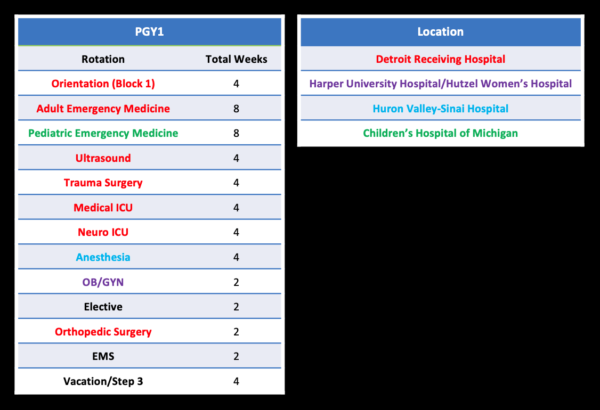

Your experience during the first year serves as the foundation for your emergency medicine career and emphasizes training in the emergency department and experience resuscitating and stabilizing critically ill or injured patients as well as developing a deeper understanding of the care they experience after admission from the emergency department and into the hospital.
Your entire first-year class will begin residency with one month of interactive discussions, focused chief complaint-based educational sessions, and hands-on skills labs during the highly regarded orientation block. Interspersed throughout the month will be shifts in the DRH ED, where you can apply your skills and knowledge while getting to know the staff, flow, logistics, and routine of our ED.
Eight additional weeks in the DRH ED are built into the first year, and for most shifts, you will work with a dedicated attending and third-year resident. First year residents aren’t “protected” from seeing high-acuity patients or patients with specific chief complaints. You will take care of the regular mix of ED patients and are responsible for running resuscitations with one-on-one coaching from a faculty member toward the end of the year.
To develop a strong foundation in pediatric emergency medicine, you will spend eight weeks in the Pediatric ED at the Children’s Hospital of Michigan. For the remainder of your residency, your Children’s shifts will be spread throughout each EM block during the year, so you can also appreciate the seasonal trends in pediatric emergency medicine.
Two well-received critical care months anchor the off-service experience in the first year. In the Neurocritical Care Unit, you will be responsible for managing patients with complex neurologic and neurosurgical emergencies, such as strokes, intracranial hemorrhage, and traumatic brain injuries. In the Medical Intensive Care Unit, you will care for a population of patients with diverse critical care needs and gain experience with ventilator management, vascular access procedures, invasive hemodynamic monitoring, and bedside ultrasound. Both critical care rotations are structured to maximize your return on investment with transportable knowledge and skills that you can apply in the emergency department setting.
Four weeks of full-time emergency department ultrasound training will lay the foundation for integration of bedside imaging into your everyday practice as an emergency physician. The rotation is entirely in the ED and is team-taught by fellowship-trained EM ultrasound faculty and a registered diagnostic sonographer.
While on the surgical service, you will manage patients with both traumatic and non-traumatic perioperative surgical concerns. You will also develop further experience participating in trauma resuscitations in the emergency department and will have the advantage of exposure to these situations from both an emergency medicine and surgical perspective.
The anesthesia block at Huron Valley/Sinai Hospital is structured to provide you with intensive experience in airway management, rapid sequence intubation, difficult airways, and procedures such as fiberoptic intubation and use of intubating LMAs. In addition, you will learn more about anesthesia pharmacology from faculty anesthesiologists and will apply your knowledge to intubation, procedural sedation, and pain management in the ED. There are also opportunities to learn techniques of regional anesthesia and nerve blocks.
In addition to integrated hand surgery and spine surgery experience, you will rotate on the Orthopedic Trauma service at DRH and hone your skills in x-ray interpretation, wound management, fracture and dislocation reduction, immobilization, and splinting. This rotation is a night-based rotation, allowing you to avoid daily morning rounds and focus mainly on ED orthopedic consults and their subsequent management.
During your two weeks at Hutzel Women’s Hospital, you will have plenty of opportunity to perform routine and high-risk deliveries and to manage the complications that occur during the peripartum period. You will also become facile with obstetrical ultrasound while evaluating patients who present with pregnancy-related concerns.
Interns will spend a dedicated two weeks rotating on EMS. This will include meeting with our EMS director and doing ambulance ride alongs. Our EMS team also runs an annual mass casualty event for the residency.
Everybody has unique interests, and this is your opportunity to pursue training in an area of your choice. Popular electives include EKGs, EMS, additional critical care training, international medicine, and clinical or basic science research. You are also free to design your own in an area of your choice!